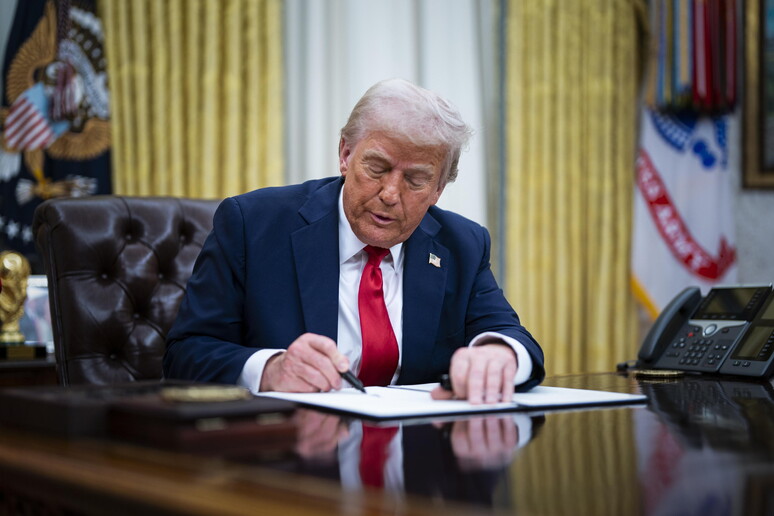Two of the world's most interconnected
global economies are hurtling towards a collision with the US
President preparing to unveil a raft of new tariffs on America's
closest trading partners. No one on either side of the Atlantic
knows what to expect.
The European Union is bracing for impact as US President Donald
Trump prepares to unveil sweeping tariffs on all countries for
what he has labelled the United States "liberation day" on April
2.
Trump wants to impose the wider US protectionist trade measures
over what he said was years of European and other countries
ripping off Americans and redressing supposedly unfair trade
imbalances.
The US President is pushing behind the scenes for the most
aggressive measures, which he sees as a historic opportunity to
radically transform the US economy, according to White House
sources.
To his closest aides, in fact, the president has admitted that
he made a mistake during his first four years in the White House
in allowing some of his advisers to dissuade him from higher
tariffs, hinting that he does not want to fall into the same
error.
While publicly flaunting confidence, the White House fears that
the announcement expected on Wednesday will create a new jolt on
the financial markets, already agitated by fears of possible
stagflation caused in part by the duties themselves.
US Vice President JD Vance and White House Chief of Staff Susie
Wiles, have in fact privately confessed that they do not know
what exactly Trump will do, who has appeared to contradict
himself several times in recent weeks.
Since taking office in January, the new US administration has
threatened, and in some cases imposed, tariffs on goods from
specific countries like Mexico, China and Canada and on targeted
sectors, including aluminium, steel and cars.
Trump has also floated the idea of universal or reciprocal
tariffs to be applied to most imports regardless of the country
of origin.
The pending announcement has also sent investors and companies
in Europe and across the world scrambling to position themselves
against the mounting uncertainty with little detail offered by
Washington.
Trump regularly rails against the European Union
The US President's threat last week to impose 25 percent tariffs
on car and parts imports added to the dour mood, and some warn
the volatility will likely continue as governments react to the
measures by either appeasing the Republican or retaliating in
kind.
Trump has been especially critical of the European Union -
because the US imports more cars from the EU than the other way
around.
The 78-year-old has repeatedly expressed his anger in the past
about the EU's tariffs on car imports from the US. While the US
only levies a 2.5 percent tariff on cars from the EU, the EU
charges 10 percent on US car imports.
However, the US tariffs on pickups and light commercial vehicles
are significantly higher at 25 percent. Some companies therefore
produce in the US or deliver the vehicles in individual parts
and assemble them in the US.
Trump is also bothered by other EU regulations, such as strict
emissions and safety standards, which could act as further
barriers to trade. A member of Trump's staff said that the 25
percent tariffs would be added to existing tariffs on car
imports.
Which European economies are at risk?
With an early focus on the automotive sector and as a major
exporting nation, Germany could be hit hard by the import
duties. However, the exposure to Trump's tariff shock extends
across Europe from Portugal and Denmark and all the way to
Bulgaria.
The Confederation of Industry, the Automotive Industry
Association and carmaker Škoda Auto have warned many Czech
exporters are at risk of losing orders due to looming US
tariffs. Indirect impacts on the Czech automotive industry can
be substantial, even though only 0.8 percent of Czech automotive
exports go to the US market, according to the Czech Chamber of
Commerce.
Bulgarian Foreign Minister Georg Georgiev also warned the new
wider US tariffs will affect the development of the
supercomputer network in Europe and will have an impact on the
Bulgarian science and research sector.
The head of Slovenia's Chamber of Commerce and Industry (GZS)
Vesna Nahtigal underlined that the automotive industry is of key
importance for Slovenia's economy. Cars and car parts exported
to the US account for 6.3% of Slovenia's exports to the country.
The EU needs to think carefully before responding to additional
US tariffs, Nahtigal warned. A response is necessary, but it
could also be good to calm the situation, she said.
"I believe that tariffs and free market restrictions aren't good
for anybody. Unfortunately, this is now reality, the zeitgeist,"
said Nahtigal. She believes that in the short-term the tariffs
will worsen the conditions for European vehicles on the US
market.
The increase in tariffs imposed by the US could have an impact
of 1.1 percent of Portugal's gross domestic product (GDP),
especially in the first two years of their implementation,
according to projections by the Bank of Portugal (BdP).
For the Euro zone, this increase in tariffs could result in a
cumulative contraction of the Euro area's GDP of between 0.5%
and 0.7% after three years, with a more significant impact in
the first year, BdP forecasts.
Although the prospect of a possible global trade conflict
creates uncertainty about the future of the Danish economy,
Danmarks Nationalbank believes in relatively high growth in the
coming years.
ALL RIGHTS RESERVED © Copyright ANSA











